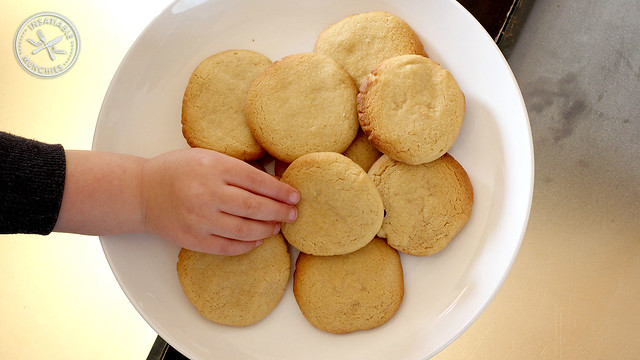Positive Parenting Tips to Keep Small Children from Sneaking Food
"No, James! I told you to ask first," repeats a frustrated mom for what seems like the hundredth time that day. If this sounds like your house, you may want to try some positive parenting techniques to keep your little one from sneaking food. Many parents have been down this road before with at least one child. As a veteran mom with kids of varying ages, I've had plenty of experience in this area. The first part of solving the issue lies in discovering the root of the sneakiness. Some kids may have an eating disorder, so it's also important to talk to the pediatrician first. These extra positive parenting tips that worked for us may help as well, if approved by the child's doctor.
Is your child getting enough food and nutrition? As children grow, they tend to eat more than they usually would, especially if they are going through a growth spurt. Some kids will even eat more than some adults. Look for signs that tell you to adjust your child's portion size at meals. If your child tries to go back for seconds and thirds or tries to have snacks immediately after dinner, you may not be providing enough to begin with. Also, pay attention to what food he sneaks and report this to the doctor, in case there is a nutritional deficiency. There may be certain vitamins and minerals lacking from the diet that your child is trying to compensate for. Are there enough snacks in between meals? If your child is trying to hoard or steal food, that may simply be a signal that he needs snacks. Keep a schedule of the times your child most often tries to steal food. If it occurs at similar times, schedule a snack at that time. If it's random, your child's feeding schedule may be inconsistent. Try to feed your child his meals and snacks at the same time every day so that his body can better form a hunger pattern. The actual time does not matter as much as it matters that the schedule stays the same. Watch for hunger cues. If you learn how your child behaves when hungry, you can intercept before he tries to sneak food. Being proactive like this is a more positive parenting method than being reactive. If you catch your child before he even thinks of doing the act, this can lessen instances without having to reprimand. If the sneaking has become a bad habit, this method may be tiring at first, but it will be worth it to see your child's sneaky food behaviors improve. Should you lock the cupboards and refrigerator? While this can be an easier temporary solution for frustrated parents, it can only make some children want the food more. It also can make a hoarding problem worse because they will want to hide food for later if they know they cannot access it easily. As small children get older, they will be more curious about how to remove the locking mechanisms. A more positive parenting method is to teach them to ask for the food, rather than take it. This way, when they are old enough to figure out locks, they are mature enough to understand why they shouldn't just steal food all the time. Never refuse food, unless it's absolutely necessary. Most children will know when they are full and will not be asking for food. Unless your child has obviously had enough, never say no when he asks for food. Also, if he sneaks food, ask something like "Why didn't you just ask for that?" If you do this consistently, your child will eventually learn that sneaking food is not necessary. This more positive way of teaching the lesson helps avoid making your child feel bad about food. Never, ever make a child feel bad about food. Also, do not use food as a reward. There needs to be a fair balance for your child to have healthy food behaviors. Using positive parenting methods to revert your child's food focus can be extremely helpful. But just like any other method, consistency is key. Be proactive, not reactive. In time, you will likely see a big improvement in your child's behavior and thoughts toward food. Note: The author's positive parenting method has evolved into what she calls Upstream Parenting. *I originally published this via Yahoo Contributor Network
1 Comment
Disciplining Without Yelling: Important for All Children
Many parents resort to yelling or shouting when their children do not listen. However, this may be damaging to your child in many ways. It can even affect the way your child behaves in school and what he thinks of himself. As a mother to many (with experience in nannying and babysitting), I have researched this topic extensively over the years.
Are You Healing or Hurting Your Child? Parental actions can either be the cause of a child's negative reactions or the cause of their healing process. It is up to the parent to decide which is better for their child. Obviously, most would choose the latter. What Are Some of The Negative Effects of Yelling? Multiple studies have shown that yelling can cause many negative effects for children. Some of those effects are feelings of fear, feeling insecure, feeling unworthy, low self-esteem, misbehavior in school or other public places, disruptive behavior, immunity to any type of discipline that involves yelling or speaking loudly, and many more. Is Your Child Worth The Struggle Not to Yell? Children are a difficult crowd to please at times, especially those with behavioral issues or those used to getting their own way. But, it can be much easier if you are willing to go through a small period of struggle first. What have you got to lose? You are likely already struggling, so a short-lived struggle is much better than an everyday one. First Steps in Ending Yelling As a Form of Discipline The first thing you need to do is make the conscious decision that you will no longer yell or shout at your child. There is a difference between speaking with a firm tone and yelling or shouting. When you speak with a firm tone, you are simply flattening your voice and you have a serious look on your face. You will be just a touch louder than normal, but you will not be close to yelling. If you are downstairs and someone upstairs can hear you, you are too loud and you are yelling. Organizing Your "No-Yelling" Plan Once you have made the decision not to yell anymore, you need a plan. Write down all the possible misbehaviors that you think your child might partake in. It doesn't have to be too specific. For example, taking a Barbie from a sibling and taking a book from a sibling is essentially the same thing, so that category could be "Using Other People's Property Without Permission". Organize the list and be sure that you don't have items that could be contained into the same category. After you have that list, rewrite it neatly on a separate piece of paper, leaving a few lines blank after each category. In those blank lines, write down what type of discipline could be used for each item. Some types of discipline will be repeated. Putting The No-Yelling Discipline Plan Into Action Think of a creative way to organize your list and frame it. Place it in an area that will be easy to access for the whole family. Whenever a child misbehaves, take him or her to the list and show him or her what the appropriate punishment is. Follow through every time. This means every time your child repeats an action that is not acceptable, take that child to chart and each time follow through with the corresponding punishment. The adjustment may be hard at first, but over time, it will get easier for you as well as for your child. Note: The author's positive parenting method has evolved into what she calls Upstream Parenting. *I originally published a version of this via Yahoo Contributor Network |
Instant Download On Order
Categories
All
Archives
May 2024
|
- Brand Shamans
- Brand Healing
- Inner Healing
-
INTENT-SIVE NATURE
- Content & Brand Elevation
- Healing Jewelry & Talismans
- Bath, Beauty, & Self-Care
- Healing Sessions
- Rituals, Herbs, & Altar Supplies
- Gawwwdess Baby Boutique
- Soul Flame Gifts
- Yoga & Meditation
- Books & Media
- Education & Homeschool Resources
- Home, RV, & Decor
- Clothing
- Pets
- Custom Orders
- Monthly Subscription Boxes
- October Festivals
- FLOW-Key Parenting
- About & Contact
- RV, Nature, & Travel Shamans
- Souls Within
- Life & Home
- Heart 'N Mind Homeschool
- The Homeschooling Mommy
- Books & Authors
- Speak Up!
- Pawsitive Pet Parenting
- Manifesterz
- Gifts In Minutes
- Brand Shamans
- Brand Healing
- Inner Healing
-
INTENT-SIVE NATURE
- Content & Brand Elevation
- Healing Jewelry & Talismans
- Bath, Beauty, & Self-Care
- Healing Sessions
- Rituals, Herbs, & Altar Supplies
- Gawwwdess Baby Boutique
- Soul Flame Gifts
- Yoga & Meditation
- Books & Media
- Education & Homeschool Resources
- Home, RV, & Decor
- Clothing
- Pets
- Custom Orders
- Monthly Subscription Boxes
- October Festivals
- FLOW-Key Parenting
- About & Contact
- RV, Nature, & Travel Shamans
- Souls Within
- Life & Home
- Heart 'N Mind Homeschool
- The Homeschooling Mommy
- Books & Authors
- Speak Up!
- Pawsitive Pet Parenting
- Manifesterz
- Gifts In Minutes



 RSS Feed
RSS Feed





